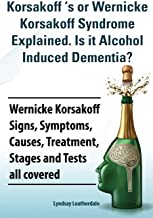Korsakoff’s Syndrome
Korsakoff’s syndrome is a disorder that primarily affects the memory system in the brain. It usually results from a deficiency of thiamine (vitamin B1), which may be caused by alcohol abuse, dietary deficiencies, prolonged vomiting, eating disorders, or the effects of chemotherapy.
Cluster Number:
Wiki Number: PW111
Diagnosis: Korsakoff’s Syndrome
US Patients: 12.5% of heavy drinkers
World Patients :
Sex Ratio:
Age Onset:
Brain Area: lack of thiamine in the brain along with prolonged use of alcohol; Wernicke encaplophathy may accompany it ; thalamus damage
Symptoms: amnesia, inventing memories, apathy, licak of insight, minimal conversation
Progression: specific “declarative” memories (events), but not procedural memories (bike-riding) can be lost
Causes: malnutrition and heavy drinking over time
Medications: adding dietary thiamine and/or Vitamin B,
Therapies:
Youtube Video: 2-Minute Neuroscience:
Wernicke-Korsakoff Syndrome
Amazon or Library Book: Korsakoff’s or Wernicke-Korsakoff Syndrome Explained.
Is it Alcohol-Induced Dementia?
Click the book to link or buy from Amazon.

